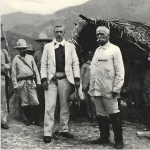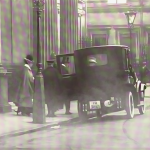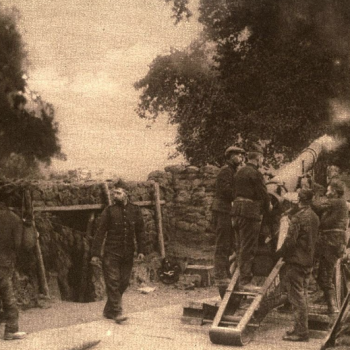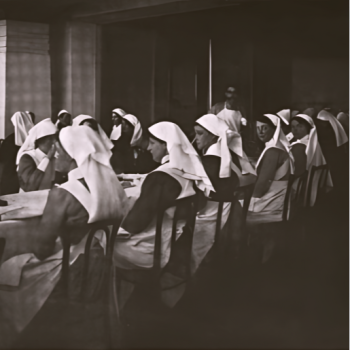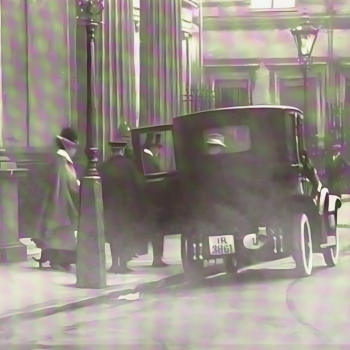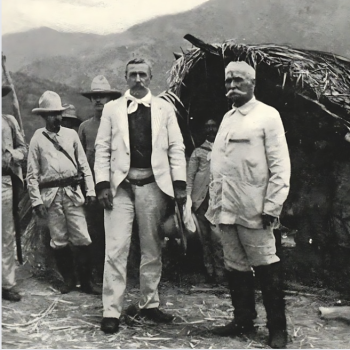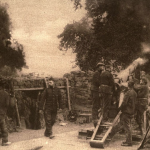During the Great War, Theodora Dodge (1871-1936,) one of the first women Egyptologists from America, volunteered for civilian relief work in France. When the conflict ended, Dodge returned to Manhattan where she resided in a hotel at 37 Fifth Avenue hotel.[1] Soon after arrival, she began contributing articles to pertaining to Egyptian mythology under the pseudonym Hetep en Neter (offering to the god or satisfaction of the god.) Dodge was a member of the Order Of The Living Christ, and when she died on February 1, 1936, she left a portion of her impressive estate to be used for the purposes of the Order. These funds would later help establish Harvard’s Center For The Study Of World Religions.[2]
The daughter of a decorated military officer, Theodore Ayrault Dodge, would also write an invaluable memoir of her time during the war. One of the few such memoirs written from a woman’s perspective, it was initially published anonymously over several years. Now, with her name restored, we can read the words which offer insight into the heart and mind of a person contextualizing war as a spiritual battle.[3] The following is her story
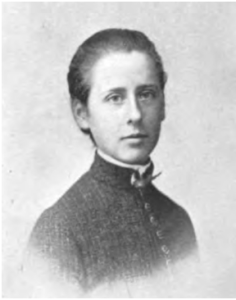
Theodora Dodge.[4]
I.
THE CREEPING SHADOW
It was in the early years of the century that I first went to live in Germany, almost a decade before the War. I had been advised, for reasons of health, to spend some time in a high altitude, and wishing to continue, as far as possible, a reasonably full and active life (a thing difficult of accomplishment in any small town, famous merely as a health resort), I chose Munich, the second highest capital in Europe, where I could easily carry on some work in which I was already engaged and in which I was deeply interested. After inscribing myself with the police (the first and unavoidable duty of any resident or even tripper,) I settled down in a little flat, much pleased at first with the life around me. Being, like many other denizens of a heedless world, interested in almost everything save politics, I was, at the start, quite blind to what was going on behind the scenes in the Germanic Empires, and while I had intended to make my stay about a twelvemonth, as a matter of fact it stretched itself into a number of years. There was thus ample opportunity, during that time, to have my-eyes opened to many things.
As if by some unrecognized, yet pre-arranged plan, the hour of my arrival had been timed with dramatic accuracy, for excitement and war-talk were in the very air—though, as I look back, it remained more or less “just talk” to me. The Moroccan Crisis was occupying the thoughts of everyone interested in “Weltpolitik.” The Kaiser’s “first gesture” had stupefied the world, which had not yet learned to know its William II; and presently we were to see Karl von Bülow strutting about, resplendent in his newly won princely title, bestowed upon him because of his “brilliant success” at Algeciras. For the moment everything seemed to smile for the Germans, but soon it began to dawn even upon them, that what had looked at first like a great victory, was in reality a dangerous defeat, for the very abasement of France had drawn England into closer sympathy with her, making, if anything, more real the true spirit of the Entente; and Russia, standing firmly by her obligations, gave unqualified proof of her loyalty; while Italy, on the other side, flaunting in the very face of her allies, her open disapproval of the whole business weakened the morale of the Triple Alliance. Austria and Germany began to see that they were in danger of standing very much alone—an unpalatable dish to the Kaiser especially.
More and more, as the months passed, did Germany realize what she had done; more and more did she resent the unqualified support which Great Britain had given to France, thus making the German discomfiture inevitable and obvious to the world at large. I think it is generally conceded that the intense hatred for England began at this time, at least the peculiar and venomous quality of hate which was to give a special color to the War-time spirit. As for France, the bitter humiliation which the Tangier episode had brought upon her, would seem in the end to have been an incalculable blessing. The exile of Déclassé has been called “the greatest sorrow France had known since Sedan,” but it was a sorrow which was to reopen her eyes to the more than ever pressing danger of the German policy of aggression—a danger which had never ceased to exist, but which had been too often forgotten.
This was, in general, my introduction to life in Germany, and I have spoken of it because it is recognized by many that, while the seeds of the World War are as old as Time (and of course older,) something difficult to define but very far reaching happened in Europe when the Moroccan bombshell burst, and that at Algeciras, with all its pain and mortification (probably because of these,) new and sacred bonds were sealed, the strength of which was to be proved less than ten years later. It is not my intention to try to give a picture of political Germany during my years of residence there. For one thing, I should be quite unfitted for the task, and for another, one can get all the political data one wants, in countless excellent books. Still, even an unofficial resident of a country has many opportunities, amusing and the reverse, to take note of the proverbial “ straws”— those apparently insignificant daily occurrences which show the way the wind is blowing; while, in retrospect, one comes to appreciate what real weather-vanes these “straws” were.
I think it has been the experience of many foreigners in pre-War days, that, going for the first time to live in Germany, particularly in South Germany, they found a peculiar charm in the smooth-running machinery of daily life; the quiet streets where almost inaudible surface-cars passed to and fro; where no unnecessary noises were permitted, barking dogs, for instance, being instantly and ruthlessly seized and suppressed, even street whistling being strictly prohibited; where no one ever seemed out of breath or, for that matter, even in a hurry; where one never saw either abject poverty or drunken ness; where the rather heavy architecture of the houses was delightfully relieved by countless window boxes full of bright flowers and trailing vines; where lovely gardens glowed in the clear, high mountain air of the little Bavarian capital. At first there seemed to be great and refreshing repose in the even tenor of life, especially to an American like myself, painfully familiar with the ceaseless roar and turmoil of our great cities. Here in Munich was the longed-for quiet. Everybody studied, everybody worked at something yet everybody had leisure for enjoyment; the consequence being that every body looked mildly contented and well-to-do, and that, like the insides of a clock, everybody seemed fitted into the very place he was best able to fill, that which best suited his peculiar constitution. Birth, death, pleasure or insanity—all were so adequately provided for that you hardly knew they occurred at all.
Presently, however, you began to miss something; then you began to have a kind of compressed feeling, as a dog must when he is given gunpowder (I think it is gunpowder) to stunt his growth, for, as it was observed by one who also lived there: “outside the indicated limits of daily life, almost nothing is permitted, almost everything forbidden.” It took you a longer or shorter time to wake up to this fact, but wake up to it you did before you were done with Germany, or Germany was done with you. It was not that the average law-abiding foreigner objected to obeying municipal or State rules and regulations, but there were such mountains of them! And everything which you might inadvertently do that turned out to be “polizeilich verboten,” no matter how innocuous its nature, was known as a “crime.” It sometimes happened that instead of being compressed into or depressed by a huge variety of municipal by-laws, which stared at you from every corner of every street, and which actually followed you into your own house— it sometimes happened that you fancied you would like to expand a trifle, according to your own national or otherwise inherited lights; to be mildly spontaneous in fact; not necessarily at the expense of your neighbor, but just to keep yourself from getting stiff and angular. If you had any such fancy as this, however, the sooner you got over it the better, and the best way of getting over the disastrous leaning toward the spontaneous in life, was to read a few pages out of the police regulations, these being not only available to all, but being rather pressed upon your individual notice. Having read, you were likely to lose some of your misplaced gaiety, for “ what a German may not do” was singularly confounding. You could not move your modest lares and penates even across the street without asking the permission of the police, a permission strictly withheld unless full and adequate reasons were forthcoming; the cleaning of your own kitchen chimney was a matter of strict police control; you might not dismiss any servant, no matter what she had done, except under certain given conditions, and even then you had to be so careful and so guarded in what you said, that it often amounted to saying nothing at all; a bull-dog (if you owned one) must be led, when walking abroad, on a leash exactly 16-centimeters-long; if you chanced to break a bottle in the street, you had to assemble and then remove the fragments of glass according to the most approved police methods; if you wished to stand still for a brief moment on the pavement, while let us say, you opened your hand-bag to take out your purse, you must be careful that the police did not catch you taking up more than the space permitted you by the authorities (so many square feet), and so on, ad infinitum. As an English resident of that period wrote: “It is, in fact, easy to discover by simple subtraction, what, if anything, a German may do” adding that, owing to the vast number of police regulations, it might safely be calculated that the detailed enforcement of each and every one of these laws would be quite impossible unless “all the inhabitants were policemen save one.” There really seemed little exaggeration in this statement.
“Supervision” was one of the key-notes of life in Germany. That was all right within reason, but the Germans never left anything whatever to the imagination, no doubt because they have found, through the long centuries, that they cannot ordinarily trust themselves to supply that most valuable and useful commodity. I give but one instance in my own experience, an experience which I well remember, and which at the time enraged me, though now it appears ludicrous enough. Returning home one day, I let myself in at my front door, unnoticed by my maid, who was busy preparing lunch in the kitchen, and passing to the rear of my flat where my bedroom was, I was very much astonished and exceedingly displeased to find two perfectly strange men, in a kind of fatigue uniform which I did not recognize, on their hands and knees on the floor, so busily occupied doing something that only one of them took the trouble to look up to give me an indifferent and fleeting glance— the kind of glance he would give had he seen a domesticated cat or dog walk in.
“What are you doing here in my apartment?” I exclaimed, indignantly, “you have had neither order nor permission to enter it.”
The only response I received was another fleeting glance from the man who had had the consideration to notice my presence when I first came in, with the added civility that he raised one hand as though he would say: “ Please don’t disturb us. Can’t you see that we are busy,” while he went on, in a measured tone, counting something out loud, for the benefit of his companion, “—sieben, acht, neun, zehn,” etc.
This was too much for me, and I walked over to the bell and rang it savagely, several times. My little maid came running, anxiety written on her face.
“What does this mean, Bertha?” I asked. “How dare you admit these men without my orders?”
The two undesirables, having apparently finished their counting, now stood up on their several feet, and the spokesman, looking at me, this time with less indifference, in fact with some surprise, said (as though he were telling me something which any idiot ought to know):
“Why, we are the police.”
“The police!” I exclaimed, taken aback; but seeing that neither of the intruders appeared to think himself the very least in the wrong, I turned to my maid (a nice, kindly little person she was): “Bertha,” I appealed, “what is it all about? I feel as though the whole lot of us had lost our minds.”
“But,” protested Bertha incredulously, speaking to me, of course, in the third person, as all well trained servants do; making use also of a specially deferential form of address, “doesn’t the gnädigste know that the police come regularly to measure the size of rooms, and to find out how many people sleep in one room? Over-crowding is polizeilich verboten.”
“Well upon my word!” I thought to myself, “here’s clock-work indeed. Each individual allotted by the Government an exact number of square feet in which he may sleep, and he may not contract this space by allowing the allotted space of anyone else to encroach upon it. It makes one think of a well-organized and commodiously planned cemetery, or something of that sort.” Then aloud to Bertha, “Even if they are the all-powerful police, don’t they so much as find out beforehand whether more than one person lives in a flat? And don’t they enquire when and if it would be convenient to have them come?”
“Oh, but,” answered Bertha, simply, “the gnädigste must surely know that with us Germans the police come whenever and as often as it suits them, and we always make them welcome.”
All this may seem to have little to do with the World War, but as a matter of fact it has much to do with it— it was one of the “straws”; for while super vision within reason is, no doubt, an excellent and wholly necessary thing, the abuse of authority is, sooner or later, almost certain to prove disastrous. So far as I can remember, this overbearing, inquisitorial officialdom, had one marked result; it inspired among the people at large, little of the spirit of willing cooperation. It was arid conscription at its worst. They obeyed because they were forced to obey, not because, at all costs, they wanted to do so. Really it amounted to little more than an unintelligent surrender to the “ Jack-in-office.” More and more did they appear to be intimidated by the very officials whom they were supposed to have elected, and finally, which is the crux, they came to believe every word these officials told them—a curiously marked trait among the rank and file of the German people. We know the results of this during the War; they did as they were told to do by those above them, whether it were to sing songs of hate, or to commit atrocities. Of course one may argue that if the heart be sound, one does not believe certain things to be right which obviously are not right; one recoils instinctively from those things; but there are certain kinds of poison which do not kill immediately; they travel slowly but with a deadly persistence through the veins, and are not discovered until it is too late; until the whole system is paralyzed.
As a matter of actual fact, however, the police were a negligible part of official Germany, and while the resident was constantly being made aware of them, much to his annoyance as in the experience I have just related, one began to realize that the “ straight jacket” policy of the police was merely a local reflection of something that was going on in the upper regions of the Government. So one began to climb, because one wanted to see what it was all about. One began to look into the schools, into the universities, into the churches, and it became a matter of some surprise to the uninitiated, that everything was the State,— and this quite literally. “L’Etat, c’est moi,” said le Roi Soleil, carrying the philosophy a step farther—but he was not a Prussian, and the “State” I am now speaking of was not just “the Government,” it was Prussia and the Prussian spirit. So one discovered that the universities and the churches were, each in its own way, a kind of political propaganda bureau; that university professors and clergymen, being all State officials, took the most surprising oaths when they came into office, oaths which amounted to a promise that, no matter what they were told to say or do by the State, they would say and do that thing obediently; that they would never do anything which even questioned the action of the State (much less could they criticize it) in any way whatsoever. If they were true to their oaths, they could neither teach nor preach what they might consider to be reform, of any sort. They could only teach or preach what was approved and dictated by Prussia. Even the mildest criticism might lead to discharge and disgrace. In return for the oaths taken, the State gave them a social prestige which they would not otherwise have had, for it understood well the value of bribes, and it knew that, to the average German, a title of any sort was a most coveted prize, and that to sell their freedom of speech was little when compared with what they gained in personal importance. One has but to remember the part which the German professors and clergymen (admittedly representing national ideals) played during the War; their unanimous and noisy justification of it, and of the atrocities which followed in its wake, and the entire support which was in consequence received from the German people— to realize what it meant: the universities and churches were controlled by the State (or Prussia), and the people were controlled by the universities and the churches.
In the schools one found the same spirit, schoolmasters being also servants of the Government, and the State being exalted to such an extent that, by imperceptible degrees, it came almost literally to replace God. Religious teaching consisted in the worship of the State rather than the worship of God; the Fatherland first, God second. It was a form of Treitschke’s teaching: “The State is above Morality.” “The crime against children” in Germany, was much written about and discussed during the War; in retrospect one can see the slow poison at work. The “hate songs,” as such, had not yet begun in the schools, it is true, but the foundation for them was being well prepared, and obviously with intention. “Incubated hate” had begun, and presently it would be hatched out. The teaching in the schools would have been really curious, had it not been worse, for in strange and indirect ways, by means both of history and geography, a child, from the moment he went to school, was taught that all nations (but especially England) were enemies of Germany; if not enemies in the open, then lurking ones. England was the arch enemy; France, though “degenerate,” was the traditional enemy, and must be watched. In fact Germany, even in the schoolroom, began to build up that horrible “wall” which was eventually to separate her from the rest of the world. Anti-British and anti-French songs were sedulously taught, and “Sedan Day” with its celebrations, had a peculiar spite—it was somewhat like the later “Lusitania School Festival.” only it was in pre-War guise. This is to mention but a part of the State propaganda.
The poison was certainly working, for gradually a hideous statistical fact was brought to the attention of the public. It came to be recognized that there were more youthful suicides in Germany than anywhere else in the world. I think few people who have not lived there can realize either the rapidity with which the “fashion” for it grew, or the extent of its practice. Some people attributed it to overwork; others to a growing rebellion against any of life’s saner restrictions. The worst, the most repellent feature, how ever, was the manner in which suicide was usually condoned if not actually defended. To the Englishman, suicide is a simple tragedy, and a coroner’s jury will almost invariably pass a verdict that the act was committed “while temporarily insane,” because it is inconceivable, no matter what the hidden motives, that a man would take his own life under any other conditions, the mere act constituting the insanity. In Germany, however, suicide was not viewed in any such unscientific light as this, and no such unadorned conclusion as “insanity” seemed to satisfy the public mind. The full pathological explanations were both diligently sought and explicitly given, and in nine cases out of ten, the unfortunate one was shown to have taken his life in order to avoid the disgrace which would have been the consequence of some serious offence. The point is, however, that few seemed to think any the worse of him for having seized this sure means of escaping justice. I well remember the first rude awakening I had. I was talking one day to a German acquaintance, about the young son of a friend of his. The boy had been found guilty of forgery, and had, according to the prevailing custom, shot himself.
“How terrible!” I exclaimed, deeply shocked at the news. “How could he do such a thing?”
“Terrible?” repeated her German acquaintance, “Why terrible?”
“You surely are not advocating suicide,” I protested.
“In such a case as this, of course I am,” he replied, earnestly, “think of the boy’s honor.”
“Honor!” I echoed, surprised in her turn. “Do you call it honor to end your life rather than to ‘face the music’ and take the consequences of your own acts?”
“But he did ‘face the music,’ as you call it; what more do you ask— he faced death.”
“Oh, that— that’s easy,” I exclaimed, “but it is not easy to drag through years of shame and disgrace in payment for your misdeeds.”
He looked at me with Teutonic stubbornness—have you ever tried to argue with the average German? His idea of argument is to talk louder and faster than you do, to drown you out, in fact, so that you shut your mouth in sheer despair, or disgust. He thus gets the last word, and that shows that you are wrong and he is right. It is merely another form of the “mailed fist.” So this particular German looked at me sullenly, a dark flush spreading slowly over his broad, rather unwholesome face, and I saw the storm clouds gather. The storm broke.
“You don’t understand us,” he blazed, rather brutally. “You don’t understand our national ideas.”
There followed a long and morbid defense of suicide as the justifiable solution when faced with an embarrassing problem, and this led to the unfolding of a neat philosophy of life in general, which amounted to this: why meet and go through with an obviously unpleasant and (to oneself) unprofitable situation, when by a little intelligent handling one can circumnavigate it, and so avoid the unpleasant consequences? Honor? What is that? Hon our is based on a purely sliding scale of morals, and what is honor today is not honor tomorrow. Why follow another’s idea of honor when you can form your own? Almost anything will turn out to be right if you can bring the situation in hand to a successful conclusion. This, in substance, was his philosophy; it was almost as baldly and shamelessly stated as that, and unfortunately, as is not infrequently true in such cases, it held its “grain of truth,” though this was wantonly misapplied. The worst part of the situation, however, was that the man who spoke was wholly representative. Years later, when a certain “scrap of paper” was torn up, I remembered this conversation with its easy philosophy, and the “scrap of paper” episode was not so difficult to understand.
In addition to the universities, the churches and the schools, there was, of course, the military side of life. One could hardly be in Germany and remain either oblivious or indifferent to that; for even if outrages like the Carlsruhe horror had not come to shock us into attention, the army was always with us, as difficult to escape as the police—a little more so. To exaggerate the sharp line of cleavage that existed between army and civilian life, would be almost impossible; the haughtiness, the air of condescension with which the army treated the rest of the world; the insufferable manner in which this sense of superiority was paraded. You could not ride in a crowded street-car without running the danger of being pushed rudely to one side by some faultlessly attired officer, who might fancy that he preferred your precarious foothold to his own. No military tactics were necessary; your position was simply commandeered because the army wanted it. If you were in a shop, and were half way through the purchase of a month’s supply of groceries, and some mere mess-sergeant came in to buy a loaf of bread, the chances were that you waited, while the German army got itself served in the person of the mess-sergeant, without delay. It was just an accepted fact— almost anything in an army uniform of whatever rank, took precedence of any civilian, of whatever rank.
The army afforded much that was interesting, however, for there was, of course, always the local military program, well calculated to appeal to the public imagination. There was the daily change of guard at noon, in front of the Royal Palace, where the outgoing and the incoming guard “goose-stepped” itself proudly before an admiring crowd, invariably assembled to watch the proceedings. A military band always played on these occasions, adding its brassy note of glamour, and acting as a kind of resounding harmonic halo for the army. There were also the regimental drills, when, across the local parade grounds, whole companies could be seen marching and wheeling, advancing with the famous German “long step,” or at a quick run, as though in a surprise attack. There were, too, the “preliminary training exercises” in barracks, like the “sideshows” at a circus, and to which, sometimes, under certain special conditions, a stranger would be admitted. I recall being taken one day to watch bayonet practice. It was thought that as a foreigner, I should be interested. I was! We sat in a kind of balcony which overhung the bare space below, where the privates were receiving instruction. When a raw recruit is first given his rifle, he is, of course, required to learn the use of every part of it, and if the energy and enthusiasm which was displayed that morning, were any criterion, I should think that there was no other part of the rifle which appealed so much to the imagination of the raw recruit. The skill and dexterity which two contestants particularly displayed, made my blood run cold. There seemed to be nothing they could not do with that flashing, cruel steel, and I thought of those words of the witty, if perfidious, Talleyrand: “On peut tout faire avec les baïonnettes excepté s’y asseoir.” I could not help inwardly thanking heaven that the recruit who was getting the worst of the fight, was not a Frenchman or an Englishman (for that fight seemed horribly real); but of course I did not voice my sentiments on that occasion—one was always too much on one’s guard not to give the Germans the satisfaction of imagining that one thought the French or the English could be bayoneted into a ditch.
Then there were the great spring maneuvers—the moving of troops, and every kind of military display to dazzle our civilian eyes—when one became painfully aware of the deadly efficiency of the German army; of its marvelous organization. Yet even in those pre-War days, I never could manage, in any talk I had, to discover that a true idealism animated it. Proud as the officers were of their army, and proud as the men in the ranks seemed to be of their officers, something always was lacking, and this puzzled me, knowing what a splendid army it was. When I tried to compare it, from the point of view of ideals, with the armies of other nations which I knew, it always fell short. To the Frenchman, for instance, the military life is a consecrated one, and warfare to him, means the fine essence of something beyond and above mere brute cudgeling; it is a romance perhaps even more than a career and I do not think that the Frenchman ever wholly loses the sense of this. But the German, so far as I could see, approached his military service in an utterly different spirit. He did not turn to it because he loved it for itself, nor because it had an irresistible attraction for him ; but because it opened to him many things which he would not otherwise have had— power and social position for example. This, so it seemed to me, was true of the officers; even, perhaps, in lesser degree, of the non-commissioned officers. The private, with no brilliant future possible to him, and no idealism to keep him afloat, appeared always to manifest a strange lack of enthusiasm which, no doubt, made him a serviceable part of the “machine,” so long as the machine ran smoothly, but of little use, because so lacking in individual fire, once the machine began to run down, and personal bravery, or the assumption of personal responsibility, became necessary. I do not, of course, mean that the German seemed to me to lack all the qualities of the soldier (that would indeed have been a blind miscalculation), but I never could see that he had the higher, the essential, the refining ones; and even in those days, the attitude of the officer toward his men, appeared to me revolting. The men in the ranks, whole regiments of them, were just “ cannon fodder” long before the World War.
Of course we all read von Bernhardi’s Germany and the Next War, when that literary high-explosive burst on our dozing minds, and it was soon evident that “ World Power or Downfall” had become a kind of slogan even with Germans in civil life who did not know much of what they were talking about. From von Moltke, “ the Battle-thinker,” to von Bernhardi, “the Hate- breeder,” was a very long step, but the step had been taken. It would, I think, be hard to find a better example of the crude inversion of an ideal than von Bernhardi’s deliberate choice of Goethe’s words (words written with such noble intent) to justify his philosophy: “ Only he deserves freedom and life who is compelled to conquer them daily.” No wonder that a few years later came another perversion, a new kind of slogan: “Only through hate can the greatest obstacles of life be overcome.”
It is difficult to describe this growing spirit of hate that one felt creeping into everything, like a poisonous vapor.
“What is the matter with Germany?” we foreign residents used to ask each other. “It isn’t a scrap what it used to be. Do you suppose it really does mean war—one day?”
Few of us, however, seemed willing or able to define the trouble; yet we knew that the trouble was there, lurking—animosity, jealousy, bitterness. When the Kaiser, referring to the rapidly growing navy, said: “Our future lies upon the sea,” and “We need this fleet to protect us from arrogance,” we knew, of course, that his words were directed primarily against England. But arrogance! What about von Bernhardi’s words: “We are the greatest civilized people known to history”; or Georg Fuchs’: “We must mold the entire mechanism of modem civilization, as it ought to be, in German form,” and many other such sentiments, loudly expressed? What about the Society for Promoting Germanism? What about the Colonial Association, with its ill-concealed aim—world domination? What about the German Navy League which had over one million members, whose sole object seemed to be to excite the entire nation by propaganda of all sorts— through the press, by lectures, by sermons, by specially arranged excursions to different ports where ships already afloat or still under construction could be inspected? Von Tirpitz, “ the most dangerous mischief maker in Europe,” as he was described abroad, was, of course, the prime mover in the Navy League, and through its organ, Die Flotte, the public nerves were made to quiver at the merest mention of the “British Menace,” which appeared to loom like a black cloud on the horizon of the national destiny.
Then there was that angle of life which came under the general head of “Kultur,” that word of horror, so associated in later years with all that was most bestial during the War; for Kultur did not mean just “ cultivated tastes” , “ higher education” , etc.; it meant the whole mentality and morality of the nation; all that the nation stood for— in fact, its “ideals.” “Germany means culture,” said the Kaiser, and, parrot-wise, the whole German world repeated: “Germany means culture.” And they really thought it. So self- hypnotized had they become that they found it difficult to admit that any other nation had made serious contributions to the civilized world; there was an astonishing lack of sympathy, or even ability to see noteworthy progress outside of Germany. This was so, perhaps more especially, in the matter of science; anything worthwhile could always be traced to German influence—and it always was. There was almost a ludicrous side when it came to literature, for everyone, from Shakespeare to Bernard Shaw, seemed to have sought and found his particular source of inspiration in Germany,—that, of course, accounted for each one’s genius. But their own contemporary drama! Many of us who were foreign residents stopped going to the theatres, so utterly vile had most of the plays become. From the early Hauptmann to the later Wedekind, was too much for us. The most pathological subjects were the most popular; suicide to escape a just punishment (and the act was always justified), murder—everything abnormal. The world was beginning to be turned up-side-down. The German evidently hungered for all such subjects; nothing was too degenerate, and all were looked upon as absorbingly interesting phases of human psychology, which could bear and which even needed the closest, most detailed analysis. Yet all seemed to be without any elements which could legitimately recommend them, save to pathologists; and these plays were repeated, night after night, to crowded houses, from which children were by no means absent. The less said about this, the better. What was to be found on the stage, was equally to be found in most of the other forms of art or amusement. Picture exhibitions became a kind of nightmare, for you never knew what you would see. The music of the day became, for the most part, unbearable—blatant, soulless. Public lectures, always a popular kind of “entertainment” in Germany, were becoming veritable “ pulpits of hate.”
Of course there were some voices raised against the growing evil. Maximilian Harden, inveighing against the Kaiser and against Kultur, all in one breath, was a most refreshing experience for us; and men like Schiffer, who declared that the form of Government most needed was “ that we shall be governed less than now […] we are in danger of being suffocated by all the love and care bestowed upon us”—outbursts like this amused us, but naturally they did not do much toward diminishing the trouble. Then, too, there was the growing rift between the North and the South. Sober-minded men like Prince Hohenlohe (South,) declared openly that Prussia cared only for the Empire in so far as Prussia itself was allowed absolutely to control it; while Prince von Bülow (North), answered that without Prussia and the Prussian spirit, the Empire could not exist at all. “Prussia is a nation of soldiers and officials,” he explained, affably. Meantime, although the South Germans continued to protest that they had no intention of being converted into Prussians, the most casual observer, if sufficiently detached, could easily see that that was exactly what was happening.
So the monstrous war machine continued to take shape, while little by little, and stone by stone, Germany built up, between herself and the world, that impassable “ wall” of hatred and envy, which was to result for her in complete moral isolation. Systematic teaching to the effect that Germany was “at bay,” and must “fight her way out,” increased throughout the country. By never-ceasing propaganda, instigated by the State, public sentiment was raised to white heat against Great Britain especially, because of the “ iron ring” which she was supposed to be forging in order to strangle Germany’s free and legitimate expansion. It was a most extraordinary obsession, a curious mixture of that arrogance of which they accused England, and of a besetting fear lest their “ place in the sun” should not be secured. If you asked any educated German why he was so anxious about that “ place in the sun,” his explanation generally was: “You see we Germans have a lofty mission in the world; we must carry our culture to the farthest ends of the earth, for it is the highest culture that ever has been or ever will be known, and the world must be made to see this, even if force be necessary. The salvation of the world really depends upon Germany.”
I used sometimes to ask: “But are you sure that the world wants to be con verted to your culture?”
“The world does not yet know what it wants; it is our great mission to teach it; it must be made to see.”
It did not require much sagacity to pierce the transparent mask; to recognize, underneath these grandiloquent words, the spirit of contempt which animated them—contempt of everything not German; and one thought to oneself: “ Do they really imagine that by contempt you can convert a world? It is conquest, not conversion which they want. It is contempt, not sympathy which they offer.” There was a brief but telling comment by a Frenchman about this time; a Frenchman still kindly enough disposed, and endeavoring to see the best; yet this is what he was compelled to write: “J ’ai essayé maintes fois de découvrir chez l’Allemand une sympathie quelconque pour d’autres nations; je n’y ai pas réussi.”
From England came the ringing voice of Lord Roberts, warning the world of the terrible danger ahead; Lord Kitchener’s voice, too, stern and steady like his own great self, urged “preparedness.” Yet, even with the coming horror staring us in the face, how few of us really listened! How little we really saw! We read of “ Bobs’ Citizen Army” , and most of us thought: “What a splendid idea!”— and got no farther. I remember being in London for a few weeks in the spring of 1909, and going to the first night of Guy du Maurier’s “An Englishman’s Home.” As I look back, I recall distinctly that the chief response of the audience to the sudden and terrible “ foreign invasion” of English soil which the play presents, was one of huge amusement. Invade England? Impossible! Ridiculous!…Could we have looked forward a few years to those agonizing days during the retreat from Mons, how differently we should have felt.
The German cauldron boiled on, throwing up to the surface first one surprise, then another. We had lived through Austria’s annexation of Bosnia, knowing, the while, that Germany was somewhere in the offing; we had raised our eyebrows at Berlin’s Russian thrust; but I think it was the Kaiser’s third and last “gesture” which shook the foreign residents still lingering in Munich, out of some of their ruts. French sympathizers, as many of us were at heart, the news of the “ Panther” shocked and alarmed us, and we read with indignation of its wanderings. When, a little later, maps, printed in Berlin, began to be circulated—maps making as clear as daylight the undiminished German colonial ambition in Morocco, this being nothing less than a stab in the back at France; when, added to this, we heard that Germany was actually demanding “ compensation” from France—many of us knew that the final hour of choice had come, and it was not long after the Agadir trouble, that I packed my household gods, paid my last visit to the police, and, with few regrets, turned my back on Germany.[5]
SOURCES
[1] “Wills For Probate.” The New York Times. (New York, New York) February 26, 1923, “Deaths.” The New York Herald Tribune. (New York, New York) February 2, 1936.
[2] Higgins, Shawn F. “The Benedick: An Analysis of Talks on Religion.” Dewey Studies. Vol. VI, No. 2. (2022): 16-75.
[3] Ayrault Dodge, Theodore. Forty Years Of Hard And Happy Work. Privately Printed by Henry S. Dunn, Boston, Mass. (1899): 322; Companions Of The Military Order Of The Loyal Legion Of The United States. L. R. Hamersley. New York, New York. (1901): 326; Petrie, Flinders “Notes and News.” Ancient Egypt. Vol. I (1916): 47; “T.S. Activities.” The Theosophical Quarterly. Vol. XXXIII No. 3 (July 1936.): 244.
[4] Ayrault Dodge, Theodore. Forty Years Of Hard And Happy Work. Privately Printed by Henry S. Dunn, Boston, Mass. (1899): 322.
[5] “The Volunteer.” (Dodge, Theodore.) “War Memories: The Creeping Shadow.” The Theosophical Quarterly. Vol. XXVI, No. 2 (October 1928.): 129-141.


